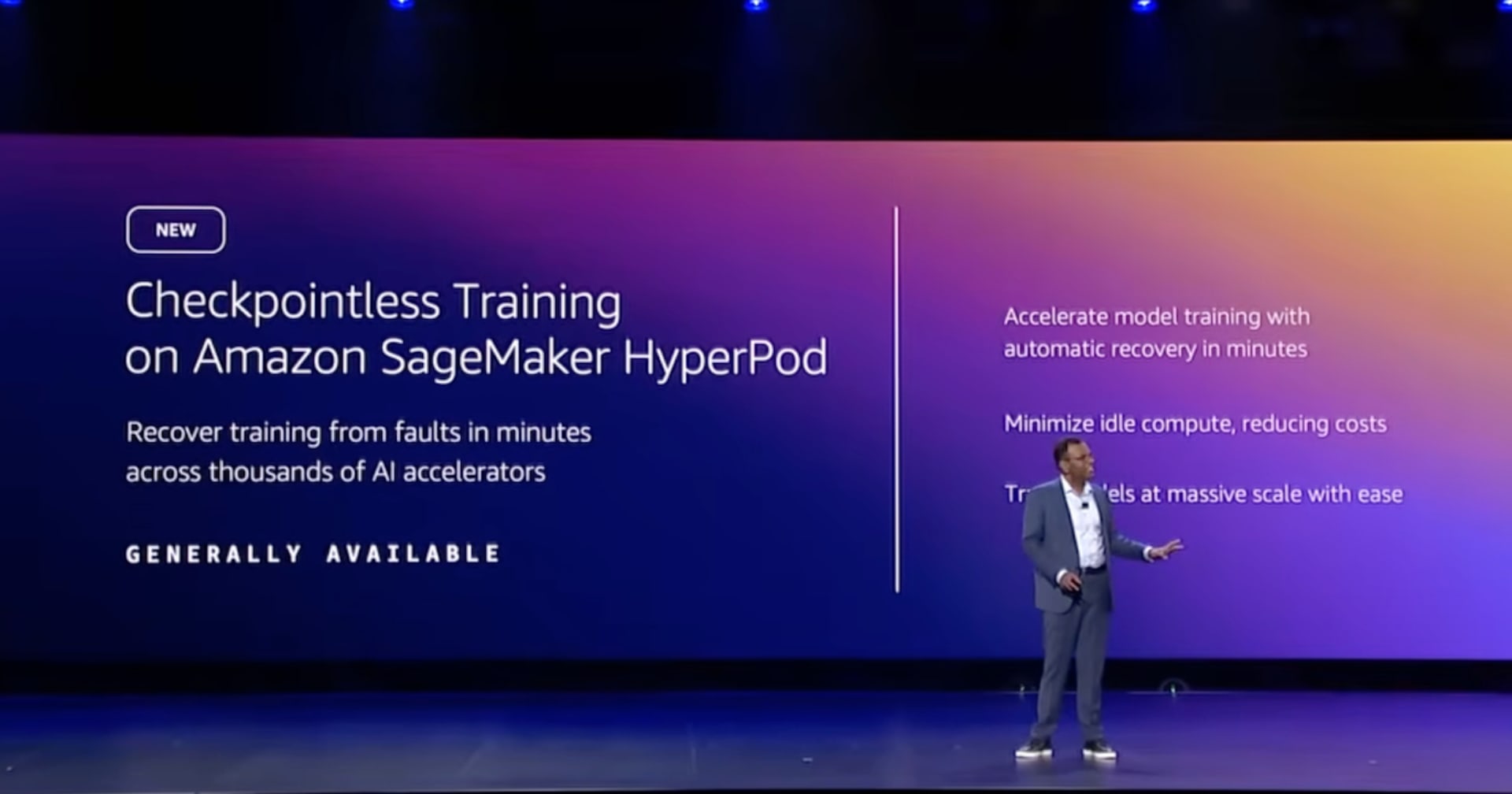![[レポート] Run high-performing FMs at scale with Amazon SageMaker HyperPod #AIM314 #AWSreInvent](https://images.ctfassets.net/ct0aopd36mqt/3IQLlbdUkRvu7Q2LupRW2o/edff8982184ea7cc2d5efa2ddd2915f5/reinvent-2024-sessionreport-jp.jpg?w=3840&fm=webp)
[レポート] Run high-performing FMs at scale with Amazon SageMaker HyperPod #AIM314 #AWSreInvent
この記事は公開されてから1年以上経過しています。情報が古い可能性がありますので、ご注意ください。
こんにちは!AWS 事業本部コンサルティング部のたかくに(@takakuni_)です。
re:Invent 2024 でラスベガスに来ています。
「Run high-performing FMs at scale with Amazon SageMaker HyperPod」という、面白そうなワークショップがあったので参加してみました。
Amazon SageMaker HyperPod、名前を聞くだけで興奮しますね。
セッション概要
タイトル
AIM314 | Run high-performing FMs at scale with Amazon SageMaker HyperPod
説明
This workshop explores the end-to-end workflow of managing foundation models (FMs) on Amazon SageMaker HyperPod. The discussion covers four critical aspects: Parameter-Efficient Fine-Tuning (PEFT), model deployment, and serving. Additionally, dive into operational aspects, including system observability and the resiliency features of Amazon SageMaker HyperPod, such as recovery from failure and job auto-resuming. Leave this hands-on session with a robust understanding of managing and deploying foundation models efficiently on AWS. Learn to use cutting-edge techniques and tools to ensure high performance, reliability, and scalability in FM development. You must bring your laptop to participate.
スピーカー
- Keita Watanabe, Sr. Solutions Architect, AWS
- Alex Iankoulski, Principal Solutions Architect, AWS
内容
アジェンダ
アジェンダは以下の通りです。内容としては Amazon EKS Support in Amazon SageMaker HyperPod のショートカットバージョンです。
-
- Cluster Setup
- a. Setup Environment Variables
- b. Configure the EKS Cluster
- c. Install Dependencies
- d. Create the HyperPod Cluster
- e. View the AWS Console
- f. Setup FSx for Lustre File System
-
- Observability/Profiling
-
- Amazon CloudWatch Container Insights
- a. Container Insights setup
-
- PyTorch DDP on CPU (t3/m5/c5)
-
- Ray on HyperPod (g5,m5)
-
- Observability/Profiling
ロングバージョンもあります。自分のアカウントでも試せるワークショップです。ぜひお試しください。
Cluster Setup
今回はオーケストレーターに EKS を利用した SageMaker Hyperpod を利用するため、 EKS クラスターのセットアップを行います。
ハンズオンでは EKS クラスターはすでに作成済みで、 Helm を使って HyperPod に必要なセットアップを行いました。
Install Dependencies
git clone https://github.com/aws/sagemaker-hyperpod-cli.git
cd sagemaker-hyperpod-cli/helm_chart
helm dependencies update HyperPodHelmChart
helm install hyperpod-dependencies HyperPodHelmChart
helm list
インストールしたパッケージは次のとおりです
- Health Monitoring Agent
- NVIDIA device plugin for Kubernetes
- Neuron device plugin
- EFA Kubernetes device plugin
- Kubeflow Training Operator
- Kubeflow MPI Operator
- Kubernetes PriorityClass
Create the HyperPod Cluster
今回は GPU を使わず、 ml.m5.2xlarge で代用しました。
SageMaker HyperPod を作成するための JSON ファイルを作成します。Orchestrator には既存で作成していた EKS クラスターを紐付けます。
{
"ClusterName": "ml-cluster",
"Orchestrator": {
"Eks":
{
"ClusterArn": "${EKS_CLUSTER_ARN}"
}
},
"InstanceGroups": [
{
"InstanceGroupName": "worker-group-1",
"InstanceType": "${ACCEL_INSTANCE_TYPE}",
"InstanceCount": ${ACCEL_COUNT},
"InstanceStorageConfigs": [
{
"EbsVolumeConfig": {
"VolumeSizeInGB": ${ACCEL_VOLUME_SIZE}
}
}
],
"LifeCycleConfig": {
"SourceS3Uri": "s3://${BUCKET_NAME}",
"OnCreate": "on_create.sh"
},
"ExecutionRole": "${EXECUTION_ROLE}",
"ThreadsPerCore": 2
}
],
"VpcConfig": {
"SecurityGroupIds": ["$SECURITY_GROUP"],
"Subnets":["$SUBNET_ID"]
},
"NodeRecovery": "${NODE_RECOVERY}"
}
HyperPod クラスターを作成します。
aws sagemaker create-cluster \
--cli-input-json file://cluster-config.json \
--region $AWS_REGION
aws sagemaker list-clusters \
--output table \
--region $AWS_REGION
View the AWS Console
SageMaker HyperPod の良いところの 1 つはコンソールがあるところです。SageMaker コンソールに先ほど作成した HyperPod クラスターが表示されていますね。

Setup FSx for Lustre File System
後続の DDP で利用する Lustre ファイルシステムを作成します。
sagemaker-user@default:~$ kubectl describe pvc fsx-claim
Name: fsx-claim
Namespace: default
StorageClass: fsx-sc
Status: Pending
Volume:
Labels: <none>
Annotations: volume.beta.kubernetes.io/storage-provisioner: fsx.csi.aws.com
volume.kubernetes.io/storage-provisioner: fsx.csi.aws.com
Finalizers: [kubernetes.io/pvc-protection]
Capacity:
Access Modes:
VolumeMode: Filesystem
Used By: <none>
Events:
Type Reason Age From Message
---- ------ ---- ---- -------
Normal Provisioning 5s fsx.csi.aws.com_fsx-csi-controller-5b9f6cf799-p974k_8f23a90e-6cd6-4074-a568-2f80d94a5355 External provisioner is provisioning volume for claim "default/fsx-claim"
Normal ExternalProvisioning 4s (x2 over 5s) persistentvolume-controller Waiting for a volume to be created either by the external provisioner 'fsx.csi.aws.com' or manually by the system administrator. If volume creation is delayed, please verify that the provisioner is running and correctly registered.
Amazon CloudWatch Container Insights
Observability/Profiling ということで、Container Insights のセットアップを行います。
Hyperpod の実行ロールに CloudWatch Agent のポリシーをアタッチします。
export EX_ROLE_NAME=$(echo $EXECUTION_ROLE | sed 's/.*\///')
aws iam attach-role-policy \
--role-name $EX_ROLE_NAME \
--policy-arn arn:aws:iam::aws:policy/CloudWatchAgentServerPolicy
EKS のアドオンに amazon-cloudwatch-observability を追加します。
aws eks create-addon --addon-name amazon-cloudwatch-observability --cluster-name $EKS_CLUSTER_NAME
うまくエージェントが動いていますね。
sagemaker-user@default:~$ kubectl get pods -n amazon-cloudwatch
NAME READY STATUS RESTARTS AGE
amazon-cloudwatch-observability-controller-manager-57fcb55gtdcb 1/1 Running 0 5m57s
cloudwatch-agent-hvsks 1/1 Running 0 5m54s
cloudwatch-agent-lznhm 1/1 Running 0 5m54s
fluent-bit-ptqfj 1/1 Running 0 5m57s
fluent-bit-q8j8x 1/1 Running 0 5m57s
PyTorch DDP on CPU (t3/m5/c5)
Setup
今回は SageMaker Hyperpod で PyTorch を使った CPU (ml.m5.2xlarge) インスタンスでの分散データ並列(DDP)を行いました。
まずは Docker イメージの作成から ECR へのプッシュまでです。ファイルシステムには先ほど作成した FSx Lustre を利用します。
cd ~
git clone https://github.com/aws-samples/awsome-distributed-training/
cd awsome-distributed-training/3.test_cases/16.pytorch-cpu-ddp/kubernetes
export AWS_REGION=$(aws ec2 describe-availability-zones --output text --query 'AvailabilityZones[0].[RegionName]')
export ACCOUNT=$(aws sts get-caller-identity --query Account --output text)
export REGISTRY=${ACCOUNT}.dkr.ecr.${AWS_REGION}.amazonaws.com/
docker build $DOCKER_NETWORK -t ${REGISTRY}fsdp:pytorch2.2-cpu ..
# Create registry if needed
REGISTRY_COUNT=$(aws ecr describe-repositories | grep \"fsdp\" | wc -l)
if [ "$REGISTRY_COUNT" == "0" ]; then
aws ecr create-repository --repository-name fsdp
fi
# Login to registry
echo "Logging in to $REGISTRY ..."
aws ecr get-login-password | docker login --username AWS --password-stdin $REGISTRY
# Push image to registry
docker image push ${REGISTRY}fsdp:pytorch2.2-cpu
Training
モデルのトレーニングに移ります。
今回用に PVC の名前とエポック数を変更します。
apiVersion: v1
kind: Service
metadata:
name: etcd
spec:
ports:
- name: etcd-client-port
port: 2379
protocol: TCP
targetPort: 2379
selector:
app: etcd
---
apiVersion: apps/v1
kind: Deployment
metadata:
labels:
app: etcd
name: etcd
spec:
replicas: 1
selector:
matchLabels:
app: etcd
template:
metadata:
labels:
app: etcd
spec:
containers:
- name: etcd
command: ["/usr/local/bin/etcd"]
args:
- "--data-dir"
- "/var/lib/etcd"
- "--enable-v2"
- "--listen-client-urls"
- "http://0.0.0.0:2379"
- "--advertise-client-urls"
- "http://0.0.0.0:2379"
- "--initial-cluster-state"
- "new"
image: quay.io/coreos/etcd:latest
ports:
- containerPort: 2379
name: client
protocol: TCP
- containerPort: 2380
name: server
protocol: TCP
restartPolicy: Always
---
apiVersion: "kubeflow.org/v1"
kind: PyTorchJob
metadata:
name: fsdp
spec:
elasticPolicy:
rdzvBackend: etcd
rdzvHost: etcd
rdzvPort: 2379
minReplicas: 1
maxReplicas: 64
maxRestarts: 100
metrics:
- type: Resource
resource:
name: cpu
target:
type: Utilization
averageUtilization: 90
pytorchReplicaSpecs:
Worker:
replicas: 2
restartPolicy: OnFailure
template:
metadata:
labels:
app: fsdp
spec:
volumes:
- name: shmem
hostPath:
path: /dev/shm
- name: local
hostPath:
path: /mnt/k8s-disks/0
- name: fsx-pv
persistentVolumeClaim:
+ claimName: fsx-claim
+ # claimName: fsx-pvc
#nodeSelector:
# node.kubernetes.io/instance-type: "ml.m5.2xlarge"
containers:
- name: pytorch
image: 509677657506.dkr.ecr.us-west-2.amazonaws.com/fsdp:pytorch2.2-cpu
imagePullPolicy: Always
command:
- /opt/conda/bin/torchrun
- --nproc_per_node=4
- --nnodes=2
- /workspace/ddp.py
+ - "50000"
- "10"
- --batch_size=32
- --checkpoint_path=/fsx/snapshot.pt
volumeMounts:
- name: shmem
mountPath: /dev/shm
- name: local
mountPath: /local
- name: fsx-pv
mountPath: /fsx
fsdp.yaml-template の内容をアプライします。
kubectl apply -f ./fsdp.yaml
うまく動いていますね。
sagemaker-user@default:~$ kubectl get po
NAME READY STATUS RESTARTS AGE
etcd-6bcc78d587-dltq9 1/1 Running 0 5m32s
fsdp-worker-0 1/1 Running 0 5m32s
fsdp-worker-1 1/1 Running 0 5m32s
hyperpod-dependencies-hyperpod-helm-chart-6f8989f9bb-54bpn 1/1 Running 0 58m
hyperpod-dependencies-mpi-operator-574c8c7f-bbpzh 1/1 Running 0 58m
次のステップように削除しちゃいます。
kubectl delete -f ./fsdp.yaml
Ray on HyperPod (g5,m5)
Ray は並列な Python アプリケーションを実行するように設計されたオープンソースの分散コンピューティングフレームワークです。私も今回はじめて触りました。
Ray クラスタ、ジョブ、サービスデプロイと管理に必要なツールをコンテナ化した aws-do-ray リポジトリを利用しました。

sagemaker-user@default:~/awsome-distributed-training/3.test_cases/16.pytorch-cpu-ddp/kubernetes$ cd ~
mkdir -p ~/wd
cp env_vars wd
docker run -it $DOCKER_NETWORK -v ${HOME}/wd:/wd -v ${HOME}/.aws:/root/.aws -v ${HOME}/.kube:/root/.kube --workdir /ray public.ecr.aws/hpc-cloud/aws-do-ray bash
Unable to find image 'public.ecr.aws/hpc-cloud/aws-do-ray:latest' locally
latest: Pulling from hpc-cloud/aws-do-ray
7478e0ac0f23: Already exists
a3a939b9441c: Pull complete
e627462bdfb5: Pull complete
8f04ec8bab35: Pull complete
Digest: sha256:ad8cc8699911f39ed4af4117fdf227f8719a0ff8530ffb7466fd0f70072a8a9a
Status: Downloaded newer image for public.ecr.aws/hpc-cloud/aws-do-ray:latest
__
____ __ _______ ____/ /___ _________ ___ __
/ __ `/ | /| / / ___/_____/ __ / __ \______/ ___/ __ `/ / / /
/ /_/ /| |/ |/ (__ )_____/ /_/ / /_/ /_____/ / / /_/ / /_/ /
\__,_/ |__/|__/____/ \__,_/\____/ /_/ \__,_/\__, /
/____/
aws-do-ray shell v20241125
alias - show list of command shortcuts
ll - list files in current directory
total 12K
drwxr-xr-x 7 root root 140 Nov 26 07:58 .
drwxr-xr-x 1 root root 28 Dec 2 17:59 ..
drwxr-xr-x 7 root root 99 Nov 26 07:58 deploy
drwxr-xr-x 3 root root 4.0K Nov 26 07:58 ops
drwxr-xr-x 3 root root 231 Nov 26 07:58 raycluster
drwxr-xr-x 3 root root 142 Nov 26 07:58 rayjob
drwxr-xr-x 6 root root 245 Nov 26 07:58 rayservice
-rwxrwxr-x 1 root root 615 Nov 26 07:58 remove-dependencies.sh
-rwxrwxr-x 1 root root 1.3K Nov 26 07:58 setup-dependencies.sh
それではデプロイします。
# Create KubeRay namespace
kubectl create namespace kuberay
# Deploy the KubeRay operator with the Helm chart repository
helm repo add kuberay https://ray-project.github.io/kuberay-helm/
helm repo update
#Install both CRDs and Kuberay operator v1.1.0
helm install kuberay-operator kuberay/kuberay-operator --version 1.1.0 --namespace kuberay
# Kuberay operator pod will be deployed onto head pod
kubectl get pods --namespace kuberay
うまくデプロイできていますね。Workshop は時間の関係上ここでフィニッシュでした。
root@default:/ray/rayservice# kubectl get pods -n kuberay
NAME READY STATUS RESTARTS AGE
kuberay-operator-69d46987ff-r6k7r 1/1 Running 0 16m
まとめ
以上、Run high-performing FMs at scale with Amazon SageMaker HyperPod でした。
そもそも SageMaker Hyperpod を EKS で動かしたことなかったので新鮮でしたし、Ray on Hyperpod も日本に帰って学び直したいと思いました。
再掲になりますが、自分のアカウントでも試せるワークショップです。ぜひお試しください。
このブログがどなたかの参考になれば幸いです。
AWS 事業本部コンサルティング部のたかくに(@takakuni_)でした!










